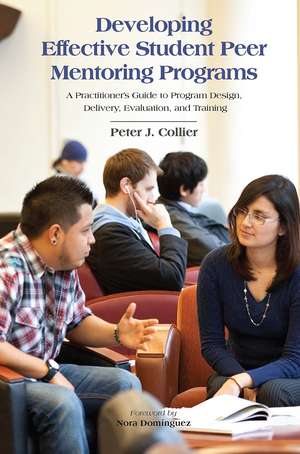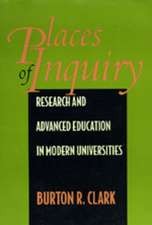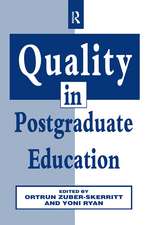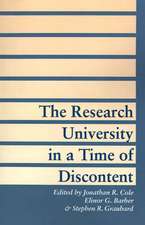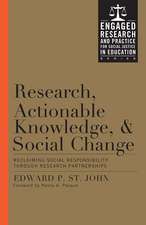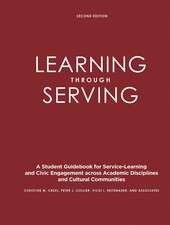Developing Effective Student Peer Mentoring Programs: A Practitioner's Guide to Program Design, Delivery, Evaluation, and Training
Autor Peter J. Collieren Limba Engleză Paperback – 7 oct 2015
| Toate formatele și edițiile | Preț | Express |
|---|---|---|
| Paperback (1) | 301.35 lei 6-8 săpt. | |
| Taylor & Francis – 7 oct 2015 | 301.35 lei 6-8 săpt. | |
| Hardback (1) | 1168.16 lei 6-8 săpt. | |
| Taylor & Francis – 17 oct 2015 | 1168.16 lei 6-8 săpt. |
Preț: 301.35 lei
Preț vechi: 317.21 lei
-5% Nou
Puncte Express: 452
Preț estimativ în valută:
57.67€ • 59.99$ • 47.61£
57.67€ • 59.99$ • 47.61£
Carte tipărită la comandă
Livrare economică 15-29 aprilie
Preluare comenzi: 021 569.72.76
Specificații
ISBN-13: 9781620360767
ISBN-10: 1620360764
Pagini: 400
Dimensiuni: 152 x 229 x 25 mm
Greutate: 0.63 kg
Ediția:1
Editura: Taylor & Francis
Colecția Routledge
Locul publicării:Oxford, United Kingdom
ISBN-10: 1620360764
Pagini: 400
Dimensiuni: 152 x 229 x 25 mm
Greutate: 0.63 kg
Ediția:1
Editura: Taylor & Francis
Colecția Routledge
Locul publicării:Oxford, United Kingdom
Public țintă
Postgraduate and Professional Practice & DevelopmentCuprins
Foreword Nora Domínguez Acknowledgments Introduction Part One. What is Peer Mentoring, and Why Does It Work to Promote Student Success? 1. What is peer mentoring, and how is it used in higher education? 2. How can peer mentoring help address the crisis of college students not completing their degrees? 3. What are the important adjustment issues college students must address to persist at college and complete their degrees? 4. How can peer mentoring help college students address specific adjustment issues and have a positive impact on persistence and degree completion? Part Two. What Are the Nuts and Bolts of Developing a College Student Peer Mentoring Program? Vignette 1. High School to College Transition-Focused Program. Retention Through an Academic Mentoring Program 5. What design issues must you consider in setting up a peer-mentoring program? Vignette 2. First-Generation Student-Focused Program. Students First Mentoring Program 6. How will you deliver mentoring support and services? Vignette 3. Transfer Student-Focused Program. Transfer Connections Program 7. What content materials will you share with mentees? Vignette4. Student Veteran-Focused Program. VETS to VETS Program 8. How are you going to train your peer mentors? Vignette 5. Undergraduate to Graduate School Transition-Focused Program. The Project for New Mexico Graduates of Color and Integrity in Graduate Training 9. How will you evaluate the impact of your peer mentoring program? Vignette 6. International Student-Focused Program. The International Student Mentoring Program 10. How will you care for and maintain your peer-mentoring program? References Index
Notă biografică
Peter J. Collier took a non-traditional road to his position at PSU and that dramatically informs his research and teaching. He deeply understands that not everyone arrives at a university skilled at being a college student. Dr. Collier began his education studying engineering at Iowa State University in the late 1960's. From there he moved to New York City where he studied at Julliard and later worked several years as a commercial song writer. He moved back to Oregon in the 1970's, but did not resume his academic studies until 1985 when he earned an associate degree in nursing from Rogue Community College. He earned a Bachelor's degree from Southern Oregon University in 1987 and finally landed at PSU after earning his Ph.D. in System Science and Sociology in 1997. His wide-ranging education and real-life experiences make Collier uniquely qualified to study and teach about the sociology of higher education, identity development and social psychology. Currently Professor Collier's research focuses on issues around how a lack of familiarity with the taken-for-granted aspects of higher education make it more difficult for students from non-traditional backgrounds to succeed at the university.
Recenzii
"I would highly recommend Peter Collier's book, Developing Effective Student Peer Mentoring Programs. It clearly walks an educator through the theory, methods, training, psychology and best practices to successfully guide future peer mentors and cross-cultural leaders."
Christie Ennis
Campus ToolKit
“As the President of the International Mentoring Association and Director of the Mentoring Institute at the University of New Mexico, I have immersed myself in the study of developmental relationships, and have seen their positive effects through my work. I consider this mentoring handbook as a vital tool for any institution that is looking to establish a peer-mentoring program, and recommend its use to those who have already implemented programs in their search to improve on their model, and thus the program’s overall effectiveness. I believe that by explicitly defining and demonstrating all of the multifaceted aspects involved in creating a mentoring program, and by addressing the best strategies to approach this subject, Developing Effective Student Peer Mentoring Programs is a must read for anyone interested in implementing a peer mentoring program on their college campus.”
Nora Domínguez, Director, Mentoring Institute
University of New Mexico
Developing Effective Student Peer Mentoring Programs is a superb book that should be read by all higher education professionals who are looking for practical strategies grounded in solid research to start a peer mentoring program. Peter Collier’s book is an accessible comprehensive guide that provides specific approaches for serving veterans, international and underrepresented students.
Buffy Smith
University of St. Thomas, Minneapolis
“Collier’s treatment of peer mentorship is THE resource you want on this topic. It is grounded in theory and scholarship but also provides practical advice and institutional examples of peer mentor programs. It is comprehensive in its coverage of the history and purpose of these programs and also addresses the important elements of successful program delivery such as recruitment, training, and evaluation. Further, it is inclusive of peer mentoring for 'new-traditional' student populations such as international, service members and veteran, and first-generation undergraduates."
Jennifer R. Keup, Director
National Resource Center for The First-Year Experience and Students in Transition
Christie Ennis
Campus ToolKit
“As the President of the International Mentoring Association and Director of the Mentoring Institute at the University of New Mexico, I have immersed myself in the study of developmental relationships, and have seen their positive effects through my work. I consider this mentoring handbook as a vital tool for any institution that is looking to establish a peer-mentoring program, and recommend its use to those who have already implemented programs in their search to improve on their model, and thus the program’s overall effectiveness. I believe that by explicitly defining and demonstrating all of the multifaceted aspects involved in creating a mentoring program, and by addressing the best strategies to approach this subject, Developing Effective Student Peer Mentoring Programs is a must read for anyone interested in implementing a peer mentoring program on their college campus.”
Nora Domínguez, Director, Mentoring Institute
University of New Mexico
Developing Effective Student Peer Mentoring Programs is a superb book that should be read by all higher education professionals who are looking for practical strategies grounded in solid research to start a peer mentoring program. Peter Collier’s book is an accessible comprehensive guide that provides specific approaches for serving veterans, international and underrepresented students.
Buffy Smith
University of St. Thomas, Minneapolis
“Collier’s treatment of peer mentorship is THE resource you want on this topic. It is grounded in theory and scholarship but also provides practical advice and institutional examples of peer mentor programs. It is comprehensive in its coverage of the history and purpose of these programs and also addresses the important elements of successful program delivery such as recruitment, training, and evaluation. Further, it is inclusive of peer mentoring for 'new-traditional' student populations such as international, service members and veteran, and first-generation undergraduates."
Jennifer R. Keup, Director
National Resource Center for The First-Year Experience and Students in Transition
Descriere
This book is primarily intended as a resource for student affairs professionals and program coordinators who are developing new peer-mentoring programs or considering refining existing ones.
